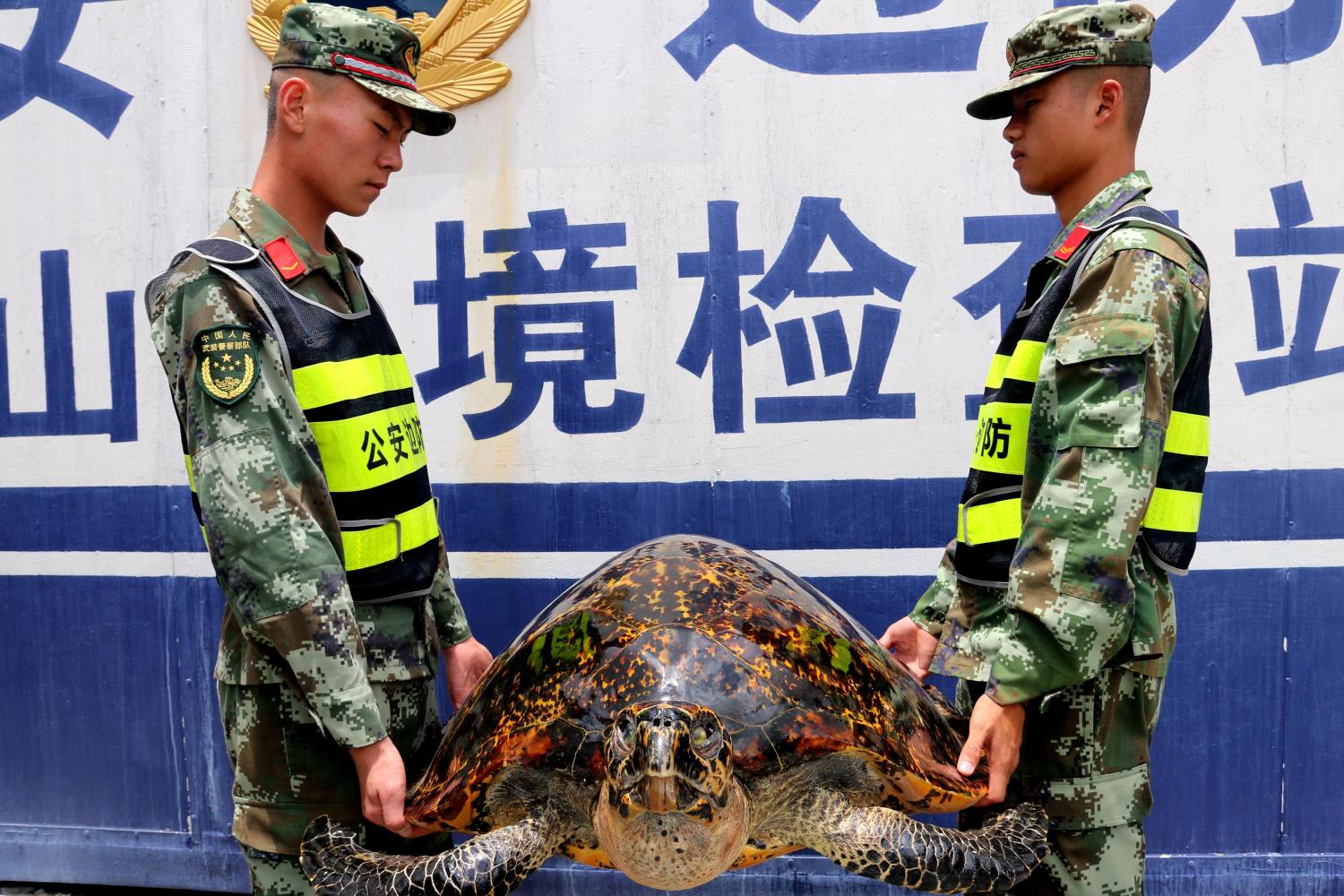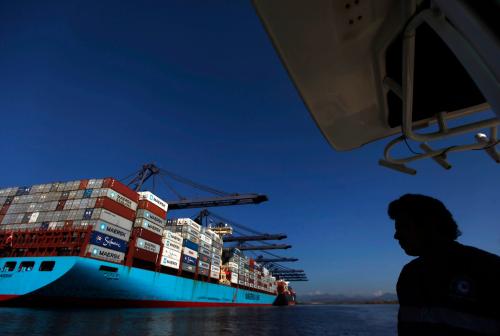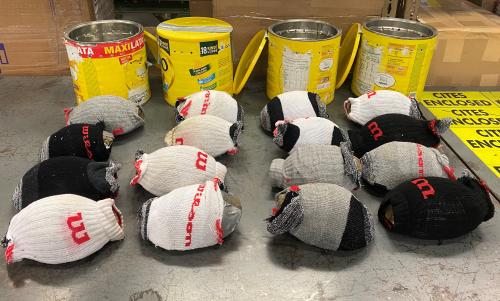EXECUTIVE SUMMARY
Wildlife trafficking from Mexico to China receives little international attention, but it is growing, compounding the threats to Mexican biodiversity posed by preexisting poaching for other markets, including the United States. Since Mexican criminal groups often control extensive territories in Mexico which become no-go-zones for government officials and environmental defenders, visibility into the extent of poaching, illegal logging, and wildlife trafficking in Mexico is limited. It is likely, however, that the extent of poaching and trafficking, including to China, is larger than commonly understood.
Terrestrial and marine species, as well as timber, illegally harvested in Mexico for Chinese markets increasingly threaten Mexico’s biodiversity. Among the species poached in Mexico and smuggled to China, sometimes via the United States, are reptiles, sea cucumbers, totoaba, abalone, sharks, and increasingly also likely jaguars as well as various species of rosewood.
Legal wildlife trade from Mexico to China, such as in sea cucumbers and crocodilian skins, provides cover for laundering poached animals. Illegal fishing accounts for a staggering proportion of Mexico’s fish production, but even the legitimate fishing and export industry provides a means to channel illegally-caught marine products to China.
The legal trade in wildlife also increasingly facilitates the money laundering activities of Mexican criminal groups, with various wildlife products used by Mexican criminal groups as a value transfer mechanism to Chinese traders in exchange for precursor chemicals for illegal drugs as such fentanyl and methamphetamine, which are then produced in Mexico from the precursors. Indeed, in Mexico, far more so than in other parts of the world, poaching and wildlife trafficking for Chinese markets is increasingly thickly intermeshed with drug trafficking, money laundering, and value transfer in illicit economies. Yet the relationship between Chinese wildlife traders and Mexican organized crime groups is also undergoing significant shifts.
Organized crime groups across Mexico, especially the Sinaloa Cartel, seek to monopolize both legal and illegal fisheries along the entire vertical supply chain. Beyond merely demanding a part of the profits, they dictate to legal and illegal fishers how much the fishers can fish, insisting that the fishers sell the harvest only to the criminal groups, and that restaurants, including those catering to international tourists, buy fish only from the criminal groups. Mexican organized crime groups set prices at which fishers can be compensated and restaurants get paid for the cartels’ marine products. The criminal groups also force processing plants to process the fish brought in by the criminal groups. And they charge extortion fees to seafood exporters.
This takeover of the fisheries by Mexican criminal groups puts Chinese traders further into direct contact with them and alters the relationship patterns. Whereas a decade and a half ago, Chinese traders in legal wildlife commodities and illegal wildlife products dealt directly with local hunters, poachers, and fishermen, increasingly, Mexican organized crime groups forcibly inserted themselves as middlemen, dict-ating that producers need to sell to them and that they themselves will sell to the Chinese traders and traffickers who move the product from Mexico’s borders to China.
Conversely, as in illegal logging, the interest of Chinese traders in an animal or plant species and efforts to source them in Mexico on a substantial scale for Chinese markets attracts the attention of Mexican criminal groups.
The Chinese government, for the most part, rejects China’s responsibility for poaching and wildlife trafficking in Mexico and insists that these problems are rather for the Mexican government to solve. Prevention and enforcement cooperation has been minimal and sporadic. The Chinese government has not been keen to formalize either China-Mexico or China-Mexico-United States cooperation against wildlife trafficking, preferring informal case-by-case cooperation.
Nonetheless, under intense international pressure, the Chinese government moved beyond seizures of the totoaba swim bladder smuggled to China from Mexico and in 2018 mounted several interdiction raids against retail markets. These raids ended the openly-visible and blatant sales of illegal wildlife commodities. Such retails moved behind closed doors and onto private online platforms. But it does not appear that China has maintained efforts to counter the now-more hidden illegal retail and mount raids against clandestine sales.
Mexican environmental protections and environmental enforcement agencies are becoming weaker as a result of actions of the Andrés Manuel López Obrador administration, even as Mexican natural resources are increasingly under threat from organized crime and wildlife traffickers. Mexican environmental agencies lack mandates, personnel, and equipment to prevent and stop environmental crime. Government officials, legal traders in wildlife commodities, and even law enforcement agencies in Mexico are systematically corrupted and intimidated by organized crime and the poor rule of law environment facilitates poaching, illegal logging, and wildlife trafficking to China.
Preventing far greater damage to Mexico’s biodiversity from illegal harvesting and poaching and wildlife and timber trafficking requires urgent attention in Mexico with far more dedicated resources, as well as meaningful international cooperation, to identify and dismantle smuggling networks and retail markets.
Español
Descargar el informe completo (PDF) »
中文
-
Acknowledgements and disclosures
I am deeply grateful to the anonymous reviewers for their very helpful suggestions. My special thanks go to Kristin Nowell for invaluable field research suggestions as well as several other researchers who prefer to remain anonymous. I would also like to thank Nathan Paul Southern and Lindsey Kennedy for their investigative work in locating additional valuable interlocutors in Asia and the Pacific for me to interview for this project. My deep thanks also go to Bradley Porter, Abigail Zisus, Wazhma Yousafi, and Ryan Harbison for great research assistance and other project support and to Cindy Zhou for her excellent research support in Chinese and more. Enormous thanks also to Ted Reinert for this superb editing of the paper and Rachel Slattery for the terrific layout. Finally, I would like to deeply thank all of my many interlocutors in Mexico, Asia and the Pacific, and the United States who were willing to speak with me, sometimes at the risks of serious repercussions from authoritarian or corrupt government officials or organized crime groups.
Brookings is grateful to the U.S. Department of State and the Institute for War and Peace Reporting for funding this research.







